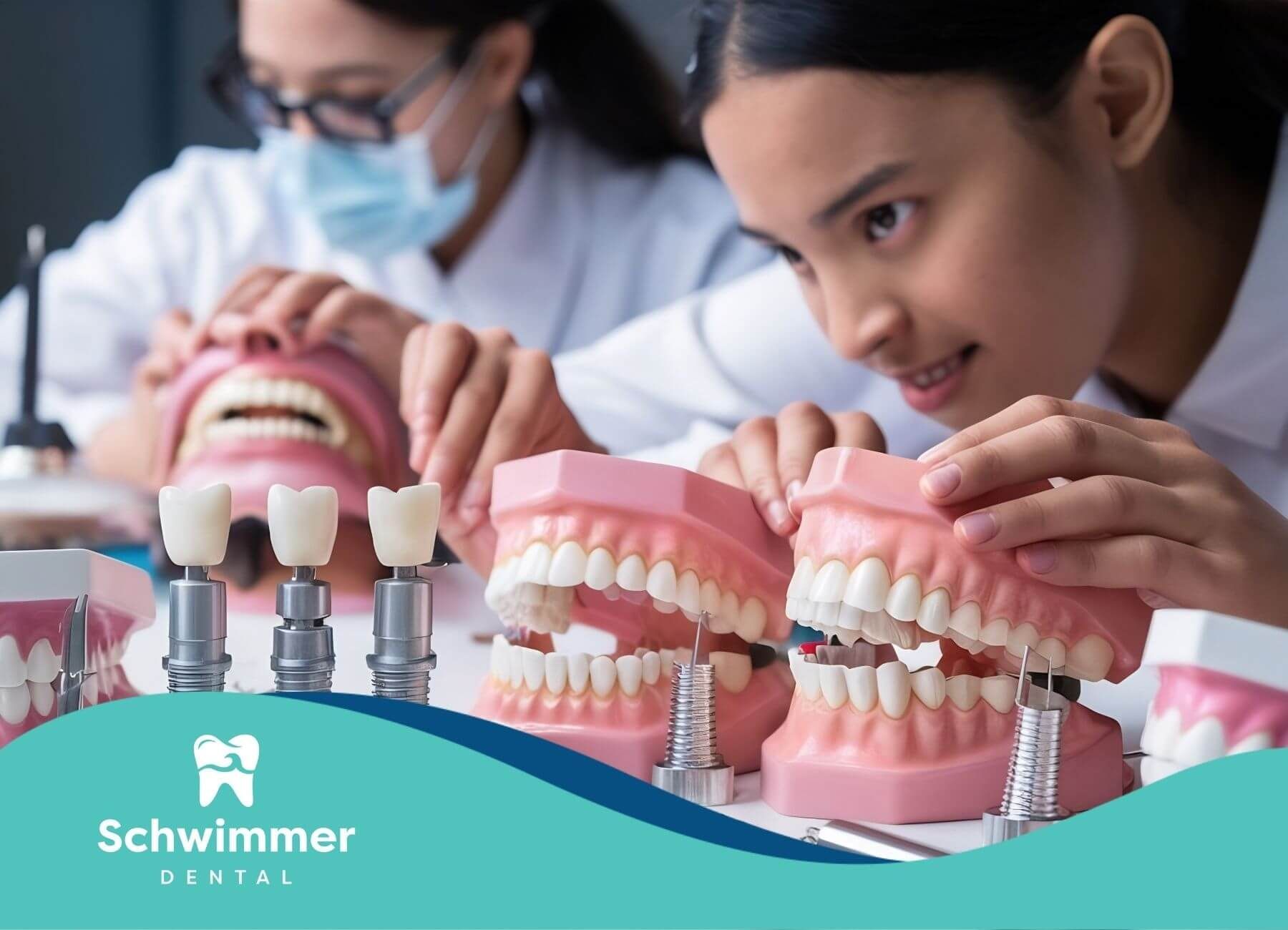Composite Resin Crowns: Lifespan, Maintenance, and Tips for Longevity
Key Highlights
- Composite resin crowns are a cost-effective dental restoration option but have a shorter lifespan compared to other materials.
- The average lifespan of a dental crown depends on its material and the patient’s oral hygiene habits.
- Regular oral hygiene maintenance, including brushing and professional cleanings, is critical for prolonging the life of resin crowns.
- Factors such as diet, lifestyle choices, and grinding habits significantly influence the longevity of a dental crown.
- Although resin crowns are less durable than porcelain or zirconia, proper care can add years to their usability.
- Regular dental visits and adopting the best care practices can maximize the durability of composite resin crowns.
When patients come to Schwimmer Dental with a need for a crown, one of the first things they ask is about its lifespan. Composite resin crowns are a popular option, offering both affordability and aesthetic appeal.
But how long can you expect your crown to stay in place? Let’s dive into what affects the lifespan of these dental crowns and what you can do to ensure they last for years.
Average Lifespan of Composite Resin Crowns:
A typical composite resin crown lasts about 5-7 years. However, this varies depending on how well it’s cared for.
Resin crowns are softer than materials like porcelain or zirconia, so they’re more prone to wear and tear. But don’t let that discourage you—if you follow the right oral care routine, you can expect your resin crown to last on the higher end of that range.
In my years as a dentist, I've seen many patients with composite resin crowns come in for check-ups. Some have been fortunate enough to keep their crowns for over 7 years, while others require replacements sooner.
One patient, for example, was diligent about brushing and flossing, and her crown held up beautifully for nearly 8 years. On the other hand, a patient who neglected proper care saw their crown start showing signs of wear after just 4 years.
The difference really comes down to how you take care of your teeth.
Durability Compared to Other Crown Materials:
Not all crowns are created equal. Here’s how composite resin stacks up against other popular materials in terms of durability:
| Material | Durability |
|---|---|
| Composite resin | 5-7 years, less resistant to wear |
| Metal crowns | 10-15 years, highly durable |
| Porcelain crowns | 10-15 years, prone to chipping |
| Zirconia crowns | 15+ years, extremely strong |
| Ceramic crowns | 10-15 years, great natural look |
While composite resin crowns are more affordable, they don’t last as long as metal or zirconia crowns. Still, they’re a great option for short-term use. If you’re looking for something more durable, a metal or zirconia crown might be worth considering.
Realistic Expectations for Longevity:
It’s important to have realistic expectations when it comes to the lifespan of your composite resin crown. While these crowns may not last as long as other materials, they’re still an effective solution for many people.
One of my patients, who opted for composite resin crowns as a more budget-friendly option, was pleased to get 6 years of use before they started showing signs of wear.
I explained that because her crown was placed on a molar, which endures more pressure while chewing, the wear would be faster. This is a common factor in how long crowns last, as the location in the mouth plays a huge role.
Factors Influencing the Lifespan of Composite Resin Crowns:
Several factors can influence how long your resin crown will last. Here’s what you should keep in mind:
Oral Hygiene and Maintenance
The foundation for making any dental restoration last is good oral hygiene. Without it, your crown will likely wear out faster. Regular brushing, flossing, and professional dental cleanings are essential for keeping plaque buildup and decay at bay.
I’ve had patients who were strict about their brushing routine and used fluoride toothpaste, which kept their crowns in good shape for years. On the other hand, those who neglected their oral care found their crowns deteriorating much sooner.
When a crown isn’t cleaned properly, bacteria can seep under the edge, causing decay and weakening the bond between the crown and the tooth underneath.
Diet and Lifestyle:
What you eat (and don’t eat) can make a big difference in how long your crown lasts.
Here are some tips to keep in mind:
- Avoid hard foods like ice or popcorn kernels—these can crack or damage your crown.
- Stay away from sticky foods like caramel or taffy, which can pull the crown loose.
- Try not to chew on non-food items like pens or fingernails, which can also cause harm.
- Reduce acidic foods and drinks (like coffee or wine) that can stain or weaken the crown material.
Tips to Extend the Life of Your Composite Resin Crown:
Taking care of your dental crown is the best way to extend its lifespan. Here are a few steps to ensure it stays in top shape:
- Stick to a regular oral hygiene routine: Brush and floss daily with fluoride toothpaste.
- Avoid chewing on hard or sticky foods: This will help prevent damage to your crown.
- Use a night guard: If you grind your teeth, a custom-made night guard will protect your crown while you sleep.
- Get regular dental check-ups: These are essential for monitoring your crown’s condition and keeping it clean.
I always tell my patients: “Your crown’s longevity depends on the care you give it.” Simple habits like using a night guard and brushing twice a day can make a huge difference in the life of your resin crown.
Best Practices for Daily Care
Maintaining a healthy smile is key to extending the life of your crown. Here’s a quick guide to follow:
- Brush twice a day using fluoride toothpaste.
- Floss regularly around the crown to prevent plaque buildup.
- Avoid using your teeth as tools—don’t open packages or bite your nails.
- Choose soft-bristle toothbrushes to prevent scratching the crown.
These daily practices will not only help your crown last longer but also ensure the health of your surrounding teeth.
The Importance of Regular Dental Visits
Booking regular dental visits isn’t just for cleanings—it’s an essential step in ensuring your crown stays in top condition.
Your dentist can identify any potential issues, such as wear or damage, before they become major problems. Additionally, professional cleanings help keep plaque from building up under the crown.
One of the best ways to make your resin crown last is to keep up with your dentist visits—twice a year is typically recommended. A quick check-up can save you from having to replace your crown prematurely.
Conclusion
Composite resin crowns are an affordable and effective option for many patients, but understanding their expected lifespan is important. With proper care—such as good oral hygiene, avoiding certain foods, and regular dental visits—you can maximize the lifespan of your crown.
Though they may not last as long as more durable materials like zirconia or metal, composite resin crowns still provide an excellent solution for many dental needs.
If you're looking for expert advice on composite resin crowns or any other dental services, look no further than Schwimmer Dental. Our experienced team is here to provide you with high-quality care and personalized treatment plans to ensure the longevity of your dental crowns and overall oral health.
Ready to schedule your consultation? Contact us today at office@schwimmerdental.com to get started on your journey toward a healthier smile!
Frequently Asked Questions
How do composite resin crowns compare to porcelain or metal crowns?
Composite resin crowns cost less, but they are less durable than metal crowns and porcelain crowns. Composite resin crowns work well if you need a crown for a short time only. Metal crowns are stronger, and porcelain crowns look better. People should choose which types of crowns fit them best by thinking about how long it will last, how much it will cost, and what they want.
Can a composite resin crown be repaired if damaged?
Yes, a composite resin crown can be fixed sometimes. It will depend on how bad the damage is. If it is just a small break, your dentist may be able to fix it. If the damage is big, you may need a new dental crown. For short-term needs, they may use temporary crowns.
What are signs that my composite resin crown needs replacing?
Describe the item or answer the question so that site visitors who are interested get more information. You can emphasize this text with bullets, italics or bold, and add links.
Sources:
- https://my.clevelandclinic.org/health/treatments/10923-dental-crowns
- https://pmc.ncbi.nlm.nih.gov/articles/PMC5125852/
- https://pubmed.ncbi.nlm.nih.gov/29800638/
- https://www.genesispub.org/comprehensive-overview-of-the-benefits-of-all-porcelain-crowns
- https://pubmed.ncbi.nlm.nih.gov/3479360/



